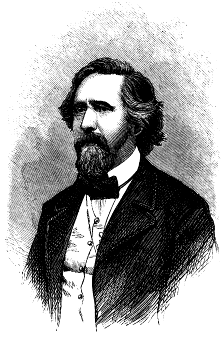|
GEORGE
JACOB
HOLYOAKE:
miscellaneous articles, papers and letters.
――――♦――――
|
|
 |
|
G. J. Holyoake
(1817-1906) |
|
|
GEORGE JACOB HOLYOAKE.
BORN APRIL 13TH, 1817.
DIED JANUARY 22ND, 1906.
|
ANOTHER
voice is hushed in death; we mourn
A leader fallen in the fight to-day;
One more great soul has passed the mystic bourne,
From whence no traveller returns to say
What lies beyond our ken; but this we feel —
That, if there be an after life at all,
Where good and ill work out man's final weal,
His portion with the best must surely fall.
If heaven is made for those who love to serve,
And give their best to cause the best to be,
And never from stern duty's pathway swerve,
High place must there be found for such as he.
For he, all through his useful, strenuous life,
Has toiled to bless his fellows in the strife.
Not what a man believes, but what he does,
Decides his future destiny; he stands
Or falls, is judged by deeds; and thus
We build our heaven or hell with our own hands.
Our friend built wisely, for he loved the truth,
And loved his fellow-men with all his heart;
All through his long career, from early youth,
By voice and pen he's ta'en the worker's part;
Mere sordid ends his generous mind abhorred,
High, noble aims held sway within his breast;
Unmoved by hopes and fears the creeds afford,
He strove to help the suffering and oppress'd;
And fought for liberty, and truth, and right —
Heaven rest his soul in the Eternal Light.
David Lawton |
――――♦――――
|
|
Down With The Tyrants (with hints
what to do with them). From The Friend Of The People, 14
Dec., 1850
|
|
Two
papers presented by Holyoake at the Sheffield meeting of the National
Association for the Promotion of Social Science, 1865:
|
|
The Working Man's Food and
Drink Adulterations: The Commonwealth, 6 October, 1866.
See the many references to food adulteration within the various
co-operative histories, e.g. ―
". . . . there was something unobserved stirring—it was
adulteration. Dr. Adam Clarke, in a long-remembered phrase,
said, "Leeds was the Garden of the Lord." But, alas, in those days no
trading conscience grew among the plants of that garden, and millers
sold flour which would give a boa constrictor indigestion and reduce him
to ribs and skin. Before the days of co-operative stores the poor man's
stomach was the waste-paper basket of the State, into which everything
was thrown which the well-to-do classes could not or would not eat. —
History of the Leeds Co-operative Society.
|
|
Benefits of Co-operation. From the
Manufacturer and Builder, New York, January 1880.
|
|
A Stranger in America.
Holyoake's interesting period reflections of a visit to the USA and
Canada. From Littell's Living Age, (republished from The
Nineteenth Century) August 17, 1880.
|
|
G. J. Holyoake. Two contrasting opinions:—
|
|
Co-operation: meeting of the
Homestead Association—Address by G. J. Holyoake of London—Annual Report;
Sept. 11, 1879.
|
|
George Eliot: George Jacob
Holyoake's Reminiscences of the Novelist, Feb. 6, 1881.
|
|
A Pleasant Chat with the Great English Secularist:
'a Retrospect of What George Jacob Holyoake has Done for the Working
Classes—His Second Visit to America and his Reasons for Making it—What he
Thinks and Says of us—His Object in the United States—Recognition of his
Services by the British Government and people—The trades
Unions—Co-operation, not Communism.'
From the
Brooklyn Eagle, Sept. 3, 1882.
|
|
Mr. Holyoake's Visit:
from the
Brooklyn Eagle, Sept. 3, 1882.
|
|
The Demand for Workmen's Trains
- The Times.
|
|
Obituary: The Times,
Tuesday 23 January, 1906, with accompanying reports in the same edition of
Holyoake's funeral and
memorial services.
――――♦―――― |
|